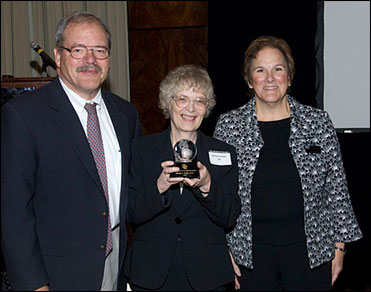Five Questions for Barbara Gaddis
Winner of the 2009 Excellence in Leadership Award

Photo by David Sprouse/University of Colorado |
| Barbara Gaddis, center, is joined by her husband, Larry Gaddis, and Peg Bacon as she receives the Excellence in Leadership Award. |
Barbara A. Gaddis, Ph.D., director of the Office of First Year Experience at the University of Colorado at Colorado Springs, received the first Excellence in Leadership Award from the CU system-based Excellence in Leadership program. The Office of First Year Experience helps freshmen and transfer students become acclimated to the university experience. Gaddis is a chemistry professor at UCCS and also serves as director of Excel Centers and director of Student Retention.
Peg Bacon, UCCS provost and executive vice chancellor for academic affairs, introduced Gaddis at the Friday, Nov. 13, award luncheon at Denver's Brown Palace Hotel. "Her unofficial title," Bacon said, "is the Energizer Bunny."
How were you inspired to take part in the leadership program?
(UCCS Chancellor) Pam Shockley-Zalabak and Peg Bacon are great, strong leadership models, particularly for women. Pam was vice chancellor of student success at the time when this program came about, and she told me, 'I want you to take this on.' Pam was the one who pushed me to get my doctorate and to think about the possibilities.
You graduated from the 2002 Emerging Leaders program (now Excellence in Leadership program). How did that experience change you?
It was the first time that I had really gotten to look at different components of the university, from admissions to records to the budget. I never had really thought about how budgets work, beyond what everybody knows. It really made me think about the big picture on campus and how it relates to the other campuses.
Had you considered yourself a leader before completing the program?
No, I'd really not thought about leadership before. With this program, people gain knowledge, they gain confidence and they nurture personal relationships. Those are all crucial to leadership, and they all interact. It's a cycle where one component leads to another. But the thing about leadership is that it's situational — anyone can be a leader at any given time.
How much more difficult is it to lead in a time of economic downturn and shrinking budgets?
It is tough. The toughest part is not knowing what will happen, and not knowing what to tell your people. But in some ways, it's invigorating. When you don't have a lot of resources, it forces you to be more innovative. We will be OK — things just may look different for now.
What advice do you have for anyone who's looking to improve in leadership?
Find a passion. Mine was teaching organic chemistry and ensuring student success. Finding a passion is the whole starting point, because leadership evolves from that. When you have something you believe in, you'll want to influence people to believe in it, too.

|